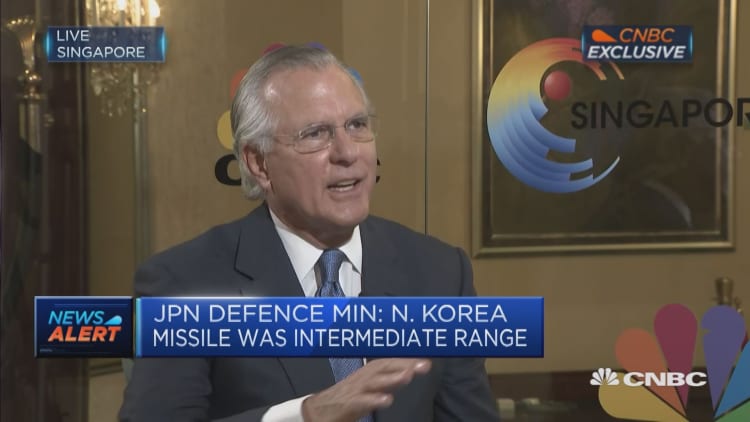
The U.S. Federal Reserve has the capacity to raise interest rates once more before the end of the year, a former official at the central bank told CNBC on Friday from the Singapore Summit.
"I don't think a quarter point would hurt," said Richard Fisher, former president of the Federal Reserve of Dallas, when asked about the potential for a December rate hike.
The Federal Open Market Committee meets next week and is widely expected to announce plans to reduce the $3.7 trillion in Treasurys and mortgage-backed securities it bought during the global financial crisis. Markets expect, however, that rates will remain unchanged in September.
"I do think the Fed has made it clear they're going to start reversing the sign on the balance sheet. It's a very gradual process. They'll probably start in September and they still have room to increase the short rate 25 basis points," Fisher, currently senior advisor at Barclays, told CNBC.
"You want some purchasing power in your little pocket in order to mitigate any downturn when it occurs. And they have a long way to go. We're still at minimal Fed funds rates," he said.
A jump in consumer inflation in August has led to increased market expectations for one more interest rate hike this year. The probability for at least one additional rate hike by year-end currently stood at 52.9 percent, according to CME Group's Fedwatch tool on Friday.
Fisher the central bank's intention for winding down its balance sheet was more about being ready for a future downturn than it is focusing on today's employment or inflation.
"What they want to do is buy back some of the balance sheet, have something to give back in case the business cycle eventually turns," he said, pointing to how U.S. economic expansion hasn't extended beyond 10 years at a stretch in history.
According to Reuters, recovery in the U.S. following the 2009 financial crisis has gone on for more than 96 months. Most economists surveyed thought expansion in the economy could continue for two more years, Reuters said.
"Eventually, [Fed officials] want to be able to soften some of the slowdown in the economy. They have to have some rate increases to do that, and they also need space in their balance sheet," Fisher explained.
He added: "So this isn't the dual mandate at work here, it's really prudent management of their balance sheet and the interest rate cycle."

